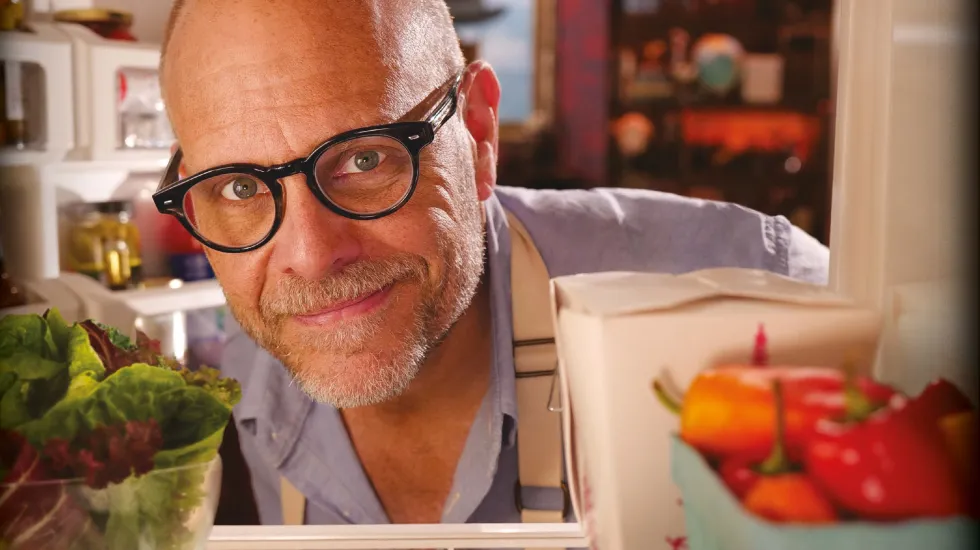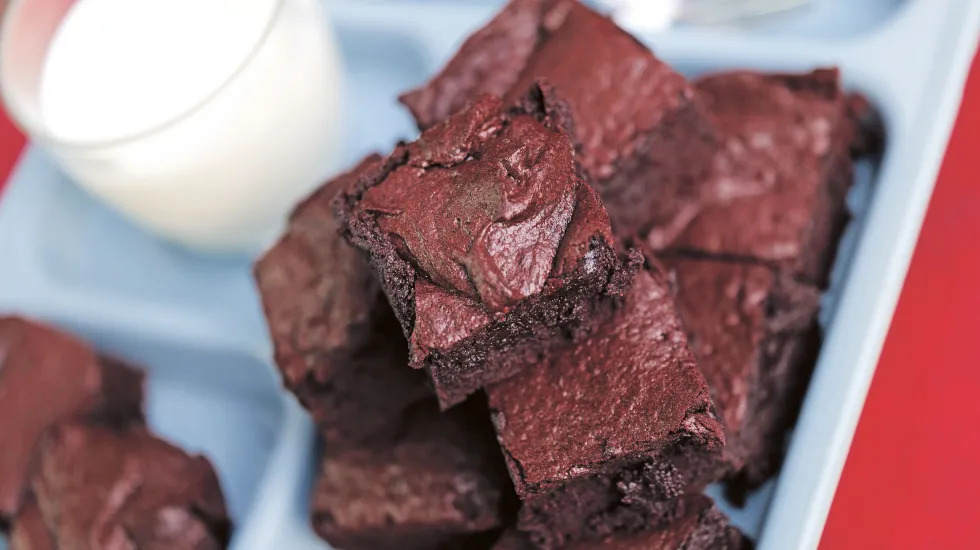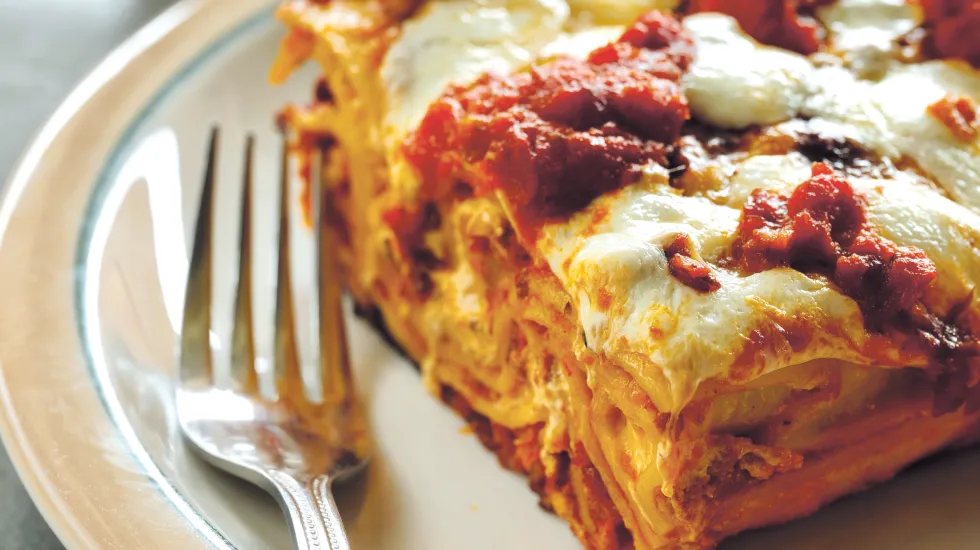
Alton Brown hasn’t spent the past few years redoing old “Good Eats” recipes because they were bad. Well, at least not all of them. There is that slow cooker lasagna recipe —which is among “the most hated” in his repertoire, he says — but more on that later.
Brown decided to revisit his cache to reflect on how the food world has changed since his signature Food Network show launched more than 20 years ago. Back then, sous vide was done by only an anointed few in the fine-dining world. Now, anyone can get a decent immersion circulator shipped overnight to their doorstep for about $100. Accessibility to ingredients has exploded. These days, even mainstream grocers stock spices like sumac and Aleppo pepper.
And, most important, people’s attitudes about cooking have changed. They are more adventurous, more willing to spend time learning-by-trying in the kitchen.
“If I had published a recipe 10 years ago that called for Gochujang, people would have thought I was nuts,” Brown, 59, says.

He feels no apprehension about including the Korean fermented red chili paste in his latest cookbook, “Good Eats: The Final Years” (Abrams, 432 pp., out now). In true Alton Brown fashion, he explains what the condiment is and how it’s made, and he uses it in a recipe (the dolsot bibimbap looks amazing).
“Understanding equals power,” he says. “You have power over your fears, so you have confidence if you know what’s going on.”
“Good Eats: The Final Years” is organized chronologically by seasons of “Good Eats: Reloaded” and “Good Eats: The Return” because “I couldn’t think of a better way to arrange them,” Brown writes.

Containing about 150 recipes, the pages are jam-packed with the history and science of food and sprinkled with Brown’s wit and sardonic humor. In a breakout section about simple roasted chicken, Brown laments countertop glass spice racks (“I would eradicate those from planet Earth if I could,” he tells us. “I would go out into the world and bulldoze those into a landfill.”) While improving his chicken parmesan recipe, Brown writes about learning the hard way that older Pyrex baking dishes were made with borosilicate glass, which stood up to rapid temperature changes under a broiler, whereas the newer formula uses soda-lime glass, which doesn’t.
In the “Lost Season” section, which focuses on the never-aired “Reloaded” Season 3, Brown offers his response to his much-maligned slow cooker lasagna recipe. For those who aren’t familiar, the slow cooker recipe uses layers of noodles, vegetables and meat along with goat’s milk powder and calls for a propane torch to brown the cheese topping.
“It’s not a good dish,” Brown says. “Clever isn’t always smart.”
His new version, which spans several pages and ends with “The Final Lasagna,” is the most lasagna lasagna out there, he says. He recommends taking a vacation between making the ragù alla bolognese and assembling the final dish because it’s “quite a bit of work.”
“I’m done with lasagna,” Brown says. “[This] is the way to do it. I can walk away. I have atoned.”
Brown is doing a book tour, hitting about a dozen cities. If you go, you might hear someone ask about his famous tips — like adding mayonnaise to get creamy scrambled eggs or starting pasta off in cold water. But what’s his greatest tip, the one he says is the single biggest thing you can do improve your cooking?
“Read the recipe,” he says. “Sit down and read it. Don’t cook. Don’t start gathering pots and pans. Make notes if you have to. ... That’s not very exciting, but it’s absolutely true.”
“Good Eats: The Final Years” isn’t just the fourth installment in the franchise’s cookbook series: It’s the last. Brown says he’s done with the iconic show—at least for now —and won’t be shooting Season 3 of “Good Eats: Reloaded.”
But before fans melt down faster than Gruyère in fondue, that doesn’t mean he’s done with entertainment.
“Iron Chef,” long beloved for pitting chefs in head-to-head, unpredictable competition, is getting a reboot on Netflix June 15.
Brown will return as host alongside newcomer Kristen Kish, who you might remember as the Season 10 “Top Chef” winner. And, of course, no “Iron Chef” show would be complete without Mark Dacascos, who’ll reprise his role as “The Chairman.”
Here’s the oven-baked asagna recipe from Alton Brown:

The Final Lasagna
Yield: One 9 × 13-inch pan (6 to 8 servings)
INGREDIENTS:
- 1 pound (454 g) dry lasagna noodles
- 1 pound (454 g) fresh mozzarella cheese, sliced 1⁄4 inch thick
- 2 cups (335 g) Ricotta Cheese (home- made, opposite)
- 1⁄4 cup heavy cream
- 1⁄2 teaspoon kosher salt
- 1⁄2 teaspoon freshly ground black pepper
- 1 cup (100 g) freshly grated Parmesan cheese
- 8 cups Ragù alla Bolognese (opposite)
- one 9 × 13-inch baking dish
- one 4-ounce ladle
DIRECTIONS:
1. Heat the oven to 400F with an oven rack in the middle position.
2. Place the noodles in a 9 # 13-inch baking dish and pour enough hot water over to cover them. Set aside until pliable, 20 to 30 minutes. Drain and separate the noodles and set aside. Dry the baking dish.
3. Place the mozzarella between double-thick layers of paper towels and leave to wick for 20 minutes. Then tear into bite-size pieces and set aside.
4. Stir the ricotta, cream, salt, and pepper together in a medium bowl.
5. Use a large (4-ounce) ladle to dose out and spread 1/2 cup of the Bolognese sauce in the bottom of the baking dish. Top with a layer of noodles, then spread 1/3 cup of the ricotta mixture over the noodles. Dot with 1/2 cup of the mozzarella and sprinkle with 2 1/2 tablespoons of the Parmesan.
6. For the next layer, start with about 1 cup sauce, spread with the bottom of the ladle, followed by noodles, ricotta, mozzarella, and Parmesan. When the final layer of noodles goes on, top generously with sauce, then the remaining mozzarella and Parmesan.
7. Lightly spray a 15 x 20-inch piece of aluminum foil with nonstick cooking spray. Tightly cover the lasagna with the foil, lube-side down, then place the baking sheet on a half sheet pan. Transfer to the oven and bake until the sauce is bubbling and the center of the lasagna is about 150F, 30 to 45 minutes. Remove the foil and continue to bake until the top is deeply browned and crisp, 20 to 30 minutes more.
8. Remove the lasagna and cool on a rack 20 minutes before serving.
Notes from Alton Brown:
I’d say peak favor is achieved after about 3 days in the fridge.
Seriously, this is it. Don’t even mention another to me.
Recipe excerpt from the new book Good Eats: The Final Years by Alton Brown, published by Abrams. Text copyright © 2022 by Alton Brown.







